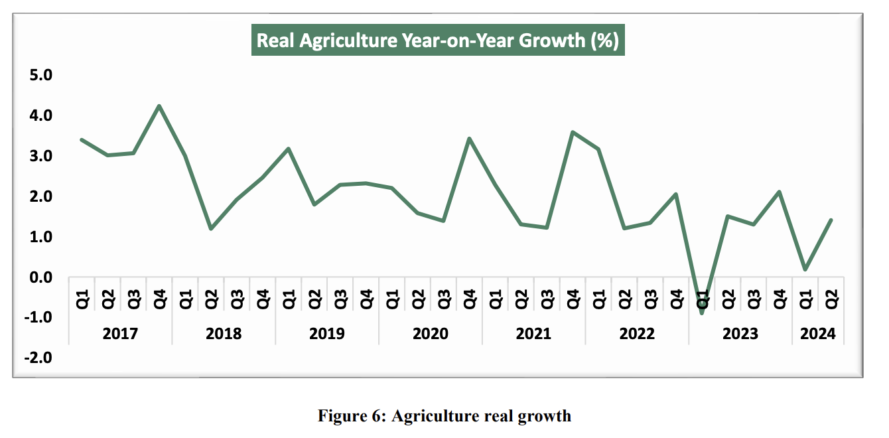Nigeria’s Agricultural Sector Shows Modest Growth in Q2 2024: Crop Production Remains Key Driver – Nigeria’s agricultural sector experienced modest growth in the second quarter of 2024, expanding by 1.41% year-on-year in real terms, according to the latest GDP report released by the National Bureau of Statistics (NBS). Although this represents a slight decrease from the 1.50% growth recorded in the same period last year, the sector continues to play a vital role in the nation’s economy, contributing 22.61% to the overall GDP in real terms.
The growth in Q2 2024 was primarily driven by Crop Production, which remains the largest sub-sector within Agriculture. Crop Production alone accounted for a significant 87.48% of the overall nominal value of the sector, underscoring its importance in feeding the nation and driving economic activity in rural areas. Despite challenges such as unpredictable weather patterns and logistical disruptions, the sub-sector managed to sustain its growth trajectory, albeit at a slower pace than in previous quarters.
Other sub-sectors within Agriculture, including Livestock, Forestry, and Fishing, also contributed to the sector’s performance, though they faced varying levels of growth and decline. Livestock, for instance, recorded a nominal growth of 11.44%, reflecting a recovery from previous contractions, while Forestry and Fishing saw growth rates of 6.37% and 3.92%, respectively.

In nominal terms, the Agriculture sector grew by 2.86% year-on-year in Q2 2024, slightly up from the 0.77% recorded in the first quarter of the year. The sector’s contribution to nominal GDP stood at 18.54%, down from 21.07% in the same quarter of 2023, indicating the effects of inflation and other economic pressures on the sector’s overall output.
Despite the modest growth, the Agriculture sector remains a critical component of Nigeria’s economy, providing employment for a large portion of the population and serving as a foundation for food security and rural development. However, the sector’s slower growth in Q2 2024 highlights ongoing challenges, including the need for improved infrastructure, access to finance, and modernization of farming practices.
The report also noted that while Crop Production continues to dominate, there is potential for diversification within the agricultural sector. Sub-sectors such as Livestock and Forestry, which showed positive growth, present opportunities for further development and investment. Expanding these areas could help stabilize the sector’s overall growth and reduce its vulnerability to external shocks.
Looking ahead, agricultural policymakers and stakeholders will need to focus on addressing the structural challenges that hinder more robust growth in the sector. This includes investing in irrigation systems to mitigate the impact of erratic rainfall, enhancing supply chain efficiencies, and promoting access to agricultural inputs and markets for smallholder farmers.
As Nigeria continues to push for economic diversification, the Agriculture sector’s performance will be closely watched. With the right policies and investments, the sector has the potential to not only sustain its current growth but also to significantly contribute to the nation’s long-term economic stability and development.






























